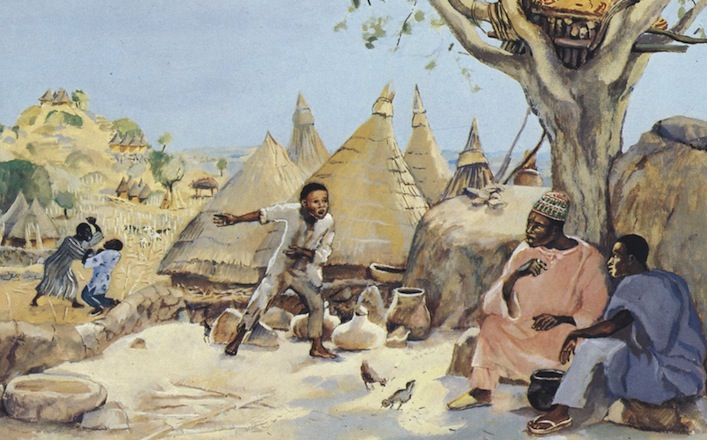Commentary on Genesis 50:15-21
Family harmony is definitely not one of the themes in Genesis.
Relationships between siblings are particularly fraught, beginning with the first sibling pair, Cain and Abel. In fact, the narrative moves directly from their birth announcements to jealousy and murder. God punishes Cain saying, “When you till the ground, it will no longer yield to you its strength; you will be a fugitive and a wanderer on the earth” (Genesis 4:12).
As the ancestor stories begin with God’s call to Abraham, we soon discover that the founding families of Genesis are not immune to conflict either. In every generation, discord is the rule rather than the exception: Ishmael and Isaac, Jacob and Esau, and then Joseph and his brothers.
Very little is said about what happens between Ishmael and Isaac as adults, although some interpreters suggest that they may have achieved a peace of sorts by the time their father Abraham dies, based on the verse that reads: “[Abraham’s] sons Isaac and Ishmael buried him in the cave of Machpelah” (Genesis 25:9).
In the cases of Jacob and Esau and then between Joseph and his brothers, there are dramatic forgiveness and reconciliation scenes in which broken relationships are restored. It takes two entire chapters, Genesis 32-33, to describe the encounter between Jacob and Esau, decades after Jacob has stolen Esau’s blessing and fled.
The reconciliation between Joseph and his brothers, years after they sold him into slavery and when Joseph has reached a high position in Egypt, unfolds over four chapters in Genesis 42-45. Joseph immediately recognizes his brothers when they come down to Egypt to buy grain during a famine in Canaan but before he reveals himself to them, he tests them — accusing them of being spies, imprisoning some of them, etc. It is not until the brothers “pass” all of the tests that Joseph finally breaks down, weeping “so loud that the Egyptians heard it,” and finally announcing: “I am Joseph. Is my father still alive?” (Genesis 45:2-3).
Given this chain of relationships between brothers throughout the Book of Genesis and how the stories of forgiveness and reconciliation become increasingly drawn out and dramatic, Genesis 50:15-21 seems to be a bit of an afterthought. In the text immediately preceding this passage, Jacob has died and Joseph and his brothers have buried him, also in the cave of Macphelah. This seems like a very clear resolution to the ancestor stories.
But no, there is one last issue that has been worrying Joseph’s brothers. “What if,” they ask themselves, “Joseph still bears a grudge against us and pays us back in full for all the wrong that we did to him?” (Genesis 50:15). In other words, now that our father Jacob is dead, will Joseph change his mind? Or, now that our father is dead, will Joseph show us what he really thinks?
These are legitimate concerns on their part. After all, they had plotted to kill him and as a compromise, sold him into slavery. Even though Joseph has done well for himself and been generous with his family up to this point, what stands in the way of taking the revenge to which he is entitled?
The brothers are a bit sheepish in returning to the issue, not quite sure how they should bring it up again after all these years. So they come up with an interesting ploy. One of the primary motivations, it seems, for Joseph to make himself known to his brothers and forgive them in Genesis 45 was his concern for his father, Jacob. “Is my father still alive?” is the first thing he asks them, after all. So now the brothers come to Joseph, saying, “Your father gave this instruction before he died, ‘Say to Joseph: I beg you, forgive the crime of your brothers and the wrong they did in harming you.’ Now therefore please forgive the crime of the servants of the God of your father” (Genesis 50:16-17).
What’s interesting about this tactic is that Jacob never seems to have said any such thing to the sons, at least not in what’s available to us in the text. And it’s not as if Jacob didn’t have the opportunity to do so since his final speech to his sons is both lengthy and detailed (Genesis 48-49). In the ancient Jewish tradition, this passage caused the rabbis considerable concern. They wondered whether it was a problem if the brothers did indeed lie to Joseph to assuage their own anxieties. Ultimately, the consensus view was that sometimes it’s alright to fabricate in order to achieve peace.
Whether or not Jacob made this statement to his sons is beside the point, though. The sons are clearly concerned about what will happen to them and they cite the authority that they know Joseph respects. In response, Joseph assures them, once again with much weeping on both sides, that they are indeed forgiven. Joseph addresses their concern directly, saying, “Do not be afraid! Am I in the place of God? Even though you intended to do harm to me, God intended it for good, in order to preserve a numerous people, as he is doing today” (Genesis 50:19-20).
Joseph’s statement is remarkable for a number of reasons, not the least of which is his willingness to place his brothers’ actions into the realm of God’s work! Joseph recognizes that even though they acted with ill intent, God used those actions for the good. This is indeed a gracious response.
This “extra” forgiveness/reconciliation scene at the end of the Book of Genesis is also significant to the larger story of the great family that began with Abraham and Sarah. Despite the conflicts throughout the generations, this scene brings the family stories of Abraham, Isaac, and Jacob to a close with the final word being one of grace and generosity. It also sets the stage for the Book of Exodus which goes on to tell a new story, the formation of a nation, the Israelites.


September 17, 2017